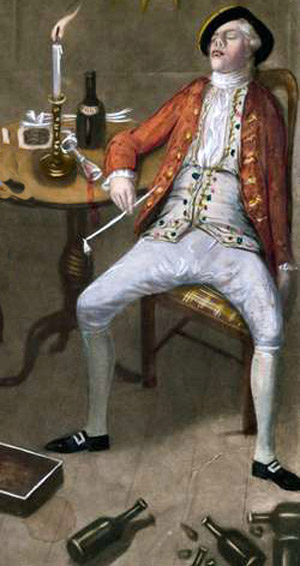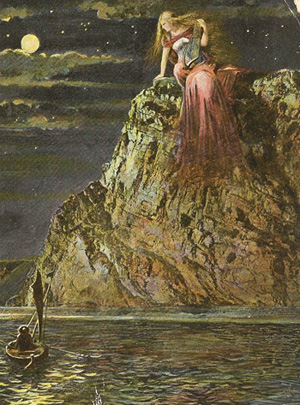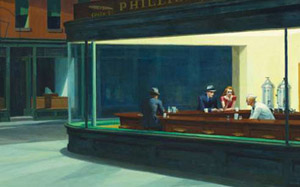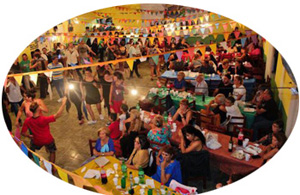Catholic Virtues
 |
 |
 |
 |
 |
 |
 |
The Thirst for Souls - II
The Interested Man & the Calvinist
I ended my last article mentioning the three categories of persons in relation to a true thirst for souls. Let me now look at the first type, those who have the need for merely material advantages.
What is wrong in the mentality of those who have only the appetite for a material conviviality in their relations with others? The key note of their spirit, very curiously, is a complete dormancy of a fundamental trait of the human spirit. A man likes something either 1) because it is similar to him and fortifies or invigorates what he already has, or 2) because it is different from him, but with a harmonic difference that completes him.
The human spirit has a need of both of these contacts. Without them he does not really live. This can rightly be called the respiration of the human soul. A person finds these similarities and differences, for example, in the life of the family, in his friends, even in the bohemian life.
What characterizes the soul of a person who falls into the state of a purely material utilitarianism is that he does not feel the least need for either similarities or differences. He is closed in himself, like a tower, and does not want to bother to be together with anyone similar or different from himself.
Further, the material objects that surround him do not express any spiritual thing for him. An object can have, at most, a purely sensible artistic connotation: A certain color pleases the eyes or not, a sound delights the ears or not.
But he does not feel any spiritual significance, which enters the picture in both the affinities felt for similar things and the harmony of dissimilar things. This he does not feel them; he is completely removed from them.
The French Calvinist
I have the impression that European peoples are much more susceptible to this disinterest of spirit than Latin peoples. We find in the former persons with a strong dose of Calvinism.
 The French can be Calvinist. John Calvin was a man who could pass 10,000 years alone. He constructed a doctrinal system, but its teachings were for his private use.
If he wanted to spread those doctrines, it was only so that he would have persons who would applaud him. But we see that, for him, the applause was not the most important thing. The crucial thing was the personal pleasure of having made a doctrine and his self-admiration.
The French can be Calvinist. John Calvin was a man who could pass 10,000 years alone. He constructed a doctrinal system, but its teachings were for his private use.
If he wanted to spread those doctrines, it was only so that he would have persons who would applaud him. But we see that, for him, the applause was not the most important thing. The crucial thing was the personal pleasure of having made a doctrine and his self-admiration.
Now, a philosopher cannot be indifferent to whether or not others know about his doctrine. He has the obligation to communicate it for the common good of men.
In Calvinism, however, there is a type of morbid, unhealthy self-sufficiency, which breaks the bonds that souls share among themselves and creates this type of egotistical state of spirit.
Here, it should be pointed out the difference of this Calvinist spirit and that of the monk, who isolates himself from men for the love of God.
The British type; the Brazilian type
Another type of man indifferent to sociability is the English or the Scottish. This type for us, who are Latins, is inconceivable: a man who buys some bottles of whiskey on Sunday to drink them closed up alone in his room, spending the whole day drinking by himself. Afterwards, he goes to bed, and on Monday, after sleeping it off, he goes out. He does not need company.
 For the Latins, to get drunk alone cannot happen. For all the peoples where the proportion of Germanic blood is very small, this does not happen. It is inconceivable.
For the Latins, to get drunk alone cannot happen. For all the peoples where the proportion of Germanic blood is very small, this does not happen. It is inconceivable.
I, for example, have never heard of a Brazilian who locks himself in a room and gets drunk alone. I think that he could not even conceive such a thing. If he were a prisoner alone in a cell and someone were to give him a bottle, perhaps then he might get drunk alone.
But, outside of this, he would be capable of making an act of heroism: He would make a tunnel to reach the neighboring cell so that he could share the bottle with the prisoner there and they could get drunk together. He cannot comprehend the pleasure of a material drunkenness by himself.
It should be noted that to be introverted by temperament, adverse to social convivium, is not in itself an evil; but if one consents to it, then it becomes so.
But, this makes no difference to the Anglo-Saxon type; he drinks alone. Afterwards, he appears before his neighbors as a very respectable man who passed all day Sunday in his room.
In fact, he spent the day drunk, he sang, fell, almost died, etc. But, on Monday, the drunkenness is worn off and quite punctually out he goes to his job, only with his nose a little red: It is the respectable Mister X.
The Germanic type
 There is a type of German, the German from the south, who is half influenced by the Latin atmosphere and gets drunk in the beer parlor, singing. But a Prussian, no: he drinks alone in a forest. He seats himself under a pine tree and drinks – all the while making metaphysical elaborations, because the German does not live without metaphysics.
There is a type of German, the German from the south, who is half influenced by the Latin atmosphere and gets drunk in the beer parlor, singing. But a Prussian, no: he drinks alone in a forest. He seats himself under a pine tree and drinks – all the while making metaphysical elaborations, because the German does not live without metaphysics.
There is, for example, the Legend of Lorelei, which goes more or less like this: Lorelei is a beautiful German maiden on a rock on the Rhine River, fixing her blond hair with a golden comb, singing.
But she is a bad woman, an evil virgin, because when the sun sets and the Rhine runs in that nighttime stillness – we can see the Wagnerian tone of the scene – the fisherman on the Rhine, alone, steers his boat homeward.
Then, he hears the notes of the seducing song of Lorelei, caressing and undulating like the waves of the river. Attracted by that haunting melody, he turns his boat in her direction, crashes into the rocks and dies. And the evil Lorelei is happy. And the Rhine continues to run.
We see that, at depth, it is the eternal, metaphysical principle of human badness fooling the simple man that unfolds in the Song of Lorelei. But, it is something still that is done alone, without company, lacking the instinct of sociability.
North American types
The North American (I am speaking here of the American caricature spread by the international press) reaches the extreme of indifference. He does not feel those needs of soul, but follows a purely material utilitarianism.
 He does not think – either when he is alone or when he is in the company of others. When he seeks out company, actually it is to flee from that spark of spirit that can rise up in him and to drown himself in noise, following that material utilitarianism.
He does not think – either when he is alone or when he is in the company of others. When he seeks out company, actually it is to flee from that spark of spirit that can rise up in him and to drown himself in noise, following that material utilitarianism.
This is different from the Prussian, who thinks on the metaphysical when he is alone and does not need others. The North American does not think about anything when alone or with others. It is indifferent to him whether he is isolated or in company. The two types are both utilitarian but with different styles.
In the next article I will look at the Romantic type and some of its variations.

Continued

What is wrong in the mentality of those who have only the appetite for a material conviviality in their relations with others? The key note of their spirit, very curiously, is a complete dormancy of a fundamental trait of the human spirit. A man likes something either 1) because it is similar to him and fortifies or invigorates what he already has, or 2) because it is different from him, but with a harmonic difference that completes him.
The human spirit has a need of both of these contacts. Without them he does not really live. This can rightly be called the respiration of the human soul. A person finds these similarities and differences, for example, in the life of the family, in his friends, even in the bohemian life.
What characterizes the soul of a person who falls into the state of a purely material utilitarianism is that he does not feel the least need for either similarities or differences. He is closed in himself, like a tower, and does not want to bother to be together with anyone similar or different from himself.
Further, the material objects that surround him do not express any spiritual thing for him. An object can have, at most, a purely sensible artistic connotation: A certain color pleases the eyes or not, a sound delights the ears or not.
But he does not feel any spiritual significance, which enters the picture in both the affinities felt for similar things and the harmony of dissimilar things. This he does not feel them; he is completely removed from them.
The French Calvinist
I have the impression that European peoples are much more susceptible to this disinterest of spirit than Latin peoples. We find in the former persons with a strong dose of Calvinism.

Calvin: immersed in self-admiration for the doctrine he constructed
Now, a philosopher cannot be indifferent to whether or not others know about his doctrine. He has the obligation to communicate it for the common good of men.
In Calvinism, however, there is a type of morbid, unhealthy self-sufficiency, which breaks the bonds that souls share among themselves and creates this type of egotistical state of spirit.
Here, it should be pointed out the difference of this Calvinist spirit and that of the monk, who isolates himself from men for the love of God.
The British type; the Brazilian type
Another type of man indifferent to sociability is the English or the Scottish. This type for us, who are Latins, is inconceivable: a man who buys some bottles of whiskey on Sunday to drink them closed up alone in his room, spending the whole day drinking by himself. Afterwards, he goes to bed, and on Monday, after sleeping it off, he goes out. He does not need company.

The English man gets drunk alone, removed from the need for others
I, for example, have never heard of a Brazilian who locks himself in a room and gets drunk alone. I think that he could not even conceive such a thing. If he were a prisoner alone in a cell and someone were to give him a bottle, perhaps then he might get drunk alone.
But, outside of this, he would be capable of making an act of heroism: He would make a tunnel to reach the neighboring cell so that he could share the bottle with the prisoner there and they could get drunk together. He cannot comprehend the pleasure of a material drunkenness by himself.
It should be noted that to be introverted by temperament, adverse to social convivium, is not in itself an evil; but if one consents to it, then it becomes so.
But, this makes no difference to the Anglo-Saxon type; he drinks alone. Afterwards, he appears before his neighbors as a very respectable man who passed all day Sunday in his room.
In fact, he spent the day drunk, he sang, fell, almost died, etc. But, on Monday, the drunkenness is worn off and quite punctually out he goes to his job, only with his nose a little red: It is the respectable Mister X.
The Germanic type

The evil Lorelei lures the lone sailor in his boat
There is, for example, the Legend of Lorelei, which goes more or less like this: Lorelei is a beautiful German maiden on a rock on the Rhine River, fixing her blond hair with a golden comb, singing.
But she is a bad woman, an evil virgin, because when the sun sets and the Rhine runs in that nighttime stillness – we can see the Wagnerian tone of the scene – the fisherman on the Rhine, alone, steers his boat homeward.
Then, he hears the notes of the seducing song of Lorelei, caressing and undulating like the waves of the river. Attracted by that haunting melody, he turns his boat in her direction, crashes into the rocks and dies. And the evil Lorelei is happy. And the Rhine continues to run.
We see that, at depth, it is the eternal, metaphysical principle of human badness fooling the simple man that unfolds in the Song of Lorelei. But, it is something still that is done alone, without company, lacking the instinct of sociability.
North American types
The North American (I am speaking here of the American caricature spread by the international press) reaches the extreme of indifference. He does not feel those needs of soul, but follows a purely material utilitarianism.

The sterile existence of not thinking whether alone or in company
This is different from the Prussian, who thinks on the metaphysical when he is alone and does not need others. The North American does not think about anything when alone or with others. It is indifferent to him whether he is isolated or in company. The two types are both utilitarian but with different styles.
In the next article I will look at the Romantic type and some of its variations.

Impossible for the Brazilians
to drink alone
Continued

Posted July 29, 2019





